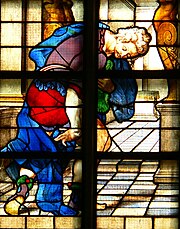User:This lousy T-shirt/Pharisee and the Publican

The parable of the Pharisee and the Publican (or the Pharisee and the Tax Collector), is one of the well known parables of Jesus. However, it appears in only one of the Canonical gospels of the New Testament. According to the Luke 18:9-14, a Pharisee, obsessed by his own virtue, is contrasted with a tax collector who humbly asks God for mercy.
This important parable demonstrates the need to pray humbly. It is found immediately following the parable of the Unjust Judge which is also on prayer.
In the Eastern Orthodox Church, the Sunday of the Publican and the Pharisee commemorates the parable and begins the three-week pre-Lenten Season.
Narrative
[change | change source]The parable is as follows:
He spoke also this parable to certain people who were convinced of their own righteousness, and who despised all others. "Two men went up into the temple to pray; one was a Pharisee, and the other was a tax collector. The Pharisee stood and prayed to himself like this: 'God, I thank you, that I am not like the rest of men, extortioners, unrighteous, adulterers, or even like this tax collector. I fast twice a week. I give tithes of all that I get.' But the tax collector, standing far away, wouldn't even lift up his eyes to heaven, but beat his breast, saying, 'God, be merciful to me, a sinner!' I tell you, this man went down to his house justified rather than the other; for everyone who exalts himself will be humbled, but he who humbles himself will be exalted."
— Luke 18:9-14, World English Bible
Context and interpretation
[change | change source]During the first century, Pharisees were well known for their strict adherence to the Law of Moses. The Pharisee in this parable went beyond his fellows, fasting more often than was required, and giving a tithe on all he receives, even in cases where the religious rules did not require it.[1] Confident in his religiousity, the Pharisee asks God for nothing, and thus receives nothing.[1]

On the other hand, publicans were despised Jews who collaborated with the Roman Empire. Because they were best known for collecting tolls or taxes (see tax farming) they are commonly described as tax collectors. The parable, however, does not condemn the publican's occupation (cf Luke 3:12-13), but describes the publican as one who "recognizes his state of unworthiness before God and confesses his need for reconciliation."[1] Coming to God in humility, the publican receives the mercy and reconciliation he asks for.[1]
Commemoration
[change | change source]In the Eastern Orthodox Church, the parable is read as part of the preparatory period leading up to Great Lent. It provides an example of the humility which should be practised during the Lenten period. The Sunday of the Publican and the Pharisee begins the three-week pre-Lenten Season and the first use of the liturgical Triodion (although the week following this Sunday is fast-free[2]). This Sunday includes a hymn inspired by the parable:
Let us flee from the pride of the Pharisee!
And learn humility from the Publican's tears!
Let us cry to our Savior,
Have mercy on us,
Only merciful One![3]
The English writer and preacher John Bunyan wrote a book on the parable in 1685.[4]
Depiction in art
[change | change source]The parable has been depicted in a variety of religious art, being especially significant in Eastern Orthodox iconography. There are works on the parable by artists such as James Tissot, John Everett Millais, Hans Holbein the Younger, and Gustave Doré.
References
[change | change source]- ↑ 1.0 1.1 1.2 1.3 Joel B. Green, The Gospel of Luke, Eerdmans, 1997, ISBN 0802823157, pp. 643-649.
- ↑ Georges Augustin Barrois, Scripture Readings in Orthodox Worship, St Vladimir's Seminary Press, 1977, ISBN 0913836419, p. 21.
- ↑ Triodion prayers at ocf.org.
- ↑ The Pharisee and Publican by John Bunyan at Project Gutenberg.
External links
[change | change source]Pharisee and the Publican, Parable of the Category:Eastern Orthodox liturgical days Category:Bible Category:Christianity Category:Jesus Christ
